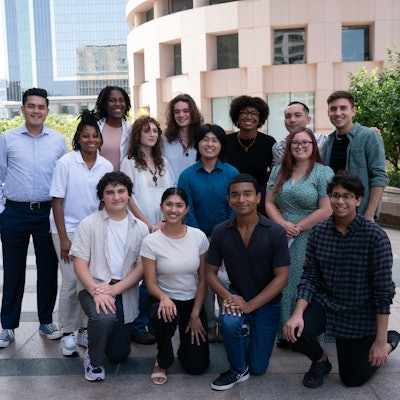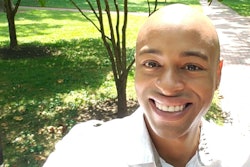Dr. Leslie Hall, director of the HBCU Program at the Human Rights Campaign — the largest LGBTQ lobbying organization in the U.S. — remembers the joyful opening of the LGBTQ+ Resource Office on the main campus of Prairie View A&M University. It coincided with HRC’s HBCU Out Loud Day, which takes place the third Wednesday of October during LGBTQ History Month.
The joy has now turned to sadness as a new law in Texas has dismantled diversity, equity, and inclusion (DEI) offices and programs at publicly funded universities.
 Point Foundation Scholars
Point Foundation Scholars
Unquestionably, the past 40 years have brought many steps forward in terms of lesbian, gay, bisexual, transgender, and queer rights, visibility, and consciousness, but in academia it is still a work in progress. A 2022 report from the UCLA School of Law Williams Institute and the Point Foundation, an LGBTQ scholarship fund, noted that 32.6% of LGBTQ people experienced bullying, harassment, or assault at college, compared to 18.9% of non-LGBTQ people. About 45.5% of LGBTQ people reported hearing slurs, and 10.3% noted they received unfair treatment from school administrators.
“The political landscape that’s targeting LGBTQ people is taking a toll on young people’s mental health, especially right now with the Supreme Court decisions and DEI efforts being removed or educational institutions being pressured by their state governments,” says Jorge Valencia, executive director of the Point Foundation.
Evolution
Liam Dacey, a 2004 graduate of University of Notre Dame (UND), one of the nation’s preeminent Catholic institutions, took steps to transfer after coming out his sophomore year, but changed his mind and instead became an advocate for LGBTQ visibility and acceptance on campus.
At the time, there was only an unapproved (not officially recognized by the university) LGBTQ student group. “There was also a standing committee on LGBTQ student needs that the student affairs office had, which did as much as they could within the confines of the administration,” he says.
Junior year, Dacey, who was in the film program, had the idea to do a UND Queer Film Festival, which debuted his senior year. It was sponsored by five academic departments and funded by the LGBTQ alumni group GALA, a separate nonprofit entity formed by LGBTQ alumni.
“Things sprang from the film festival (including an official LGBTQ student group on campus) in the decade that followed,” says Dacey.
Dacey, who recently narrated a video about LGBTQ history at UND, has remained engaged with advocacy at the university. In 2022, the university finally launched an official LGBTQ alumni affinity group, ARC. Prior to that, GALA raised over $250,000 to endow UND LGBTQ student scholarships; two are given every year.
Christopher Roth’s primary job at Guttman Community College, part of the City University of New York, is associate director of academic technology. In 2018, he wanted to get more involved with student programming, so he joined the college’s LGBTQ+ History Month committee. The following year he co-chaired the committee with the aim of creating more opportunities for students. This eventually led to applying for and receiving a grant to develop programming for LGBTQ+ students at Guttman.
“The goal was to bring new and exciting events and speakers that were accessible to students and to build awareness and provide some educational and engaging programming and resources that would offer a sense of community and belonging to our students,” says Roth. “One of the biggest factors for us is getting our leadership involved and getting them to support the work.”
 Jorge Valencia
Jorge Valencia
Guttman recently institutionalized its Lavender Graduation, a pre-graduation ceremony for LGBTQ students which the president, provost, and members of the faculty attend. Rainbow cords are distributed that students are welcome to wear at the campus-wide graduation.
When Hall was an undergraduate at Bowie State University (2007–12), an HBCU in Maryland, it was a “resource desert” for LGBTQ students. Even if he wanted to go to the counseling center, there weren’t counselors competent to discuss issues related to his coming out process. Healthcare was problematic because students from the university’s nursing program, some of whom he had classes with, were staff members in the wellness center. Those are issues that HRC has worked to address in recent years, asserting it is not best practice to have students work in health centers.
The Point Foundation was founded in 2001 and most of its early applicants were gay males whose parents refused to pay for college after they came out. The number of applicants and their diversity have increased significantly over time. As marriage equality became national, there was a shift toward greater acceptance.
“We started to focus not only on marginalization, but specifically on those who wanted to make a change in society,” says Valencia. “One of the things we changed in our mission was also a focus on leadership because we believe it is important to invest in the future of the young people that are going to further LGBTQ rights.”
Classroom
That shift in the Point Foundation’s focus led to research, such as the reports with the Williams Institute, and data gathering on the foundation’s applicant pool. In addition to scholarships and grants, there are now workshops and conferences that reflect current needs and issues. This academic year, 575 students are being supported. Over 80% identify as BIPOC or multi-racial and 51% are first-generation. A big shift was creating a scholarship open to part-time students for those individuals unable to attend college full-time.
“We evolved our mentoring program so that it better serves the students we are supporting at this time,” says Valencia.
Hall says HRC has worked to change classroom climates, such as using students’ preferred names and pronouns. Approximately one-third of HBCUs have partnered with HRC over the past 20 years to bring about institutional change, such as creating or deepening inclusive policies that support LGBTQ students.
“When schools enroll in this initiative, they have access to a confidential assessment they will take,” says Hall. “Then, we will create a plan of how they can address some of the issues that cost no money to address and some issues that do carry a fiscal note. We have consultants that work with us that we share and lend to the HBCUs to help them meet certain benchmarks. Once they have met several benchmarks, they are able to receive a seal of distinction.”
Despite decades of advocacy, what hasn’t changed at UND is the university’s non-discrimination policy, which does not include sexual orientation or gender identity.
“That remains a big problem for staff and faculty who still are afraid of coming out,” says Dacey, who has done extensive political work and is now an events consultant. “There is also still a lack of LGBTQ focused academic classes.”
Dr. Luis A. Leyva is an associate professor of Mathematics Education & STEM Higher Education in the Vanderbilt University-Peabody College of Education & Human Development. Leyva appreciates the institutional support he receives. Although the state of Tennessee has pushed back on DEI programming, Vanderbilt is a private institution. Leyva’s research examines how interlocking systems of power, including racism and cisheteropatriarcy, impact classroom teaching and student support in undergraduate mathematics and STEM education. He is the director of the PRISM (Power, Resistance & Identity in STEM Education) research lab.
His “Queer Students of Color STEM” project began with a small research grant from Peabody College and subsequently grew into a multi-institutional study with funding from the National Acadamy of Education and the Spencer Foundation across PWIs and MSIs involving 60 Black, Latinx, and Asian LGBTQ students pursuing STEM majors.
Two recently published pieces — one in the American Educational Research Journal and one in the Notices of the American Mathematical Society — elucidate the learning experiences for queer STEM students of color. “Our research project is trying to provide a model for the field of how we can transform teaching and learning spaces in mathematics and STEM broadly to be affirming of queer of color identities among undergraduate students,” says Leyva.
Leyva says the PRISM research lab at Vanderbilt is a space where all undergraduate and graduate student researchers, many of whom identify as LGBTQ+ and people of color, can bring their full selves while engaging in scholarly work. He is also a member of an interdisciplinary group of faculty members engaged in different lines of inquiry to improve the lives of LGBTQ+ people across social and policy contexts.
“Vanderbilt has also amplified our research in the PRISM lab,” says Leyva, who notes that the university has publicized any awards and publications about improving STEM education for LGBTQ+ students of color. “That indicates, to me that the university seems to take this body of scholarship as a point of pride.”
Ongoing fight for inclusion
A huge opportunity for UND undergraduates and graduate students is tapping into a vast alumni network. Dacey says that network hasn’t yet been seriously cultivated for LGBTQ students and alumni. With many faculty and staff remaining closeted, there is also a lack of role models or mentors.
The opposite is true for Leyva. “As a queer man of color myself, being able to bring that selfhood and have students who are part of PRISM actually see some aspect of themselves, they can think about embracing their social diversity in future leadership roles,” he says.
Oscar Guzmán, a former research assistant in the PRISM lab, notes Leyva’s impact. “For me, Dr. Leyva’s greatest strength comes not just from his role as a scholar, but his visibility and accountability as an advocate for those whose voices are often ignored,” he says.
Guttman offers training for faculty and staff. Those who complete it get a placard they can place on their desks which tell LGBTQ students it’s a supportive and positive space. Hall says that, in his nine years with HRC, decisions by administrative leaders not to bolster LGBTQ resources have largely been due to lack of funds, an ongoing issue at most HBCUs. “If you put an LGBTQ center in, you need to staff it and get programming money,” he says. “Gender neutral housing or gender-neutral restrooms, there’s a fiscal note attached to all of that.”
Many HBCU institutions have church-based roots. “There are some folks still on our campuses with some outdated views,” he adds. “Schools can change all of their policies, all of their non-discrimination things, and it can still be a hostile place.”
Valencia says the Point Foundation now actively engages with organizations, such as the United Negro College Fund and Native Forward Scholars Fund, which are also navigating state restrictions on DEI initiatives.
“With those pressures that are being put on universities to dismantle DEI efforts, I think it is vital for faculty, administrators and others in leadership positions that are members of the community to find a way to support those students,” Valencia says. “We formed an educational advisory board with about 12 educators that are on the ground across the country.”
HRC conducts the HBCU Leadership Summit, which provides national leadership and advocacy training that empowers LGBTQ+ students at HBCUs to act as change-agents on their campuses and in their communities — even in states dismantling DEI. Approximately 40 HBCU student leaders are brought to Washington, D.C., each year for training.
“The anti-DEI bills are having a real impact on these campuses and it’s making our work harder,” Hall says. “But the student bodies have been way more vocal than even I was when I was on campus in terms of what they require and expect out of their campuses. When we have our Leadership Summit, we don’t bring meek, mild students. These students are fierce, and they are unapologetic. They are advocates and they don’t mind shutting down the president’s office, showing up at boards of trustee meetings to tell these folks what they want. That honestly is what has really moved the needle.”














